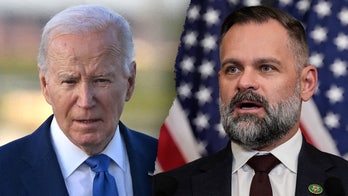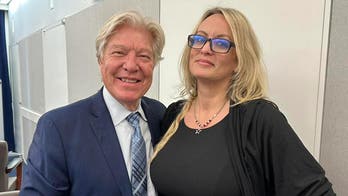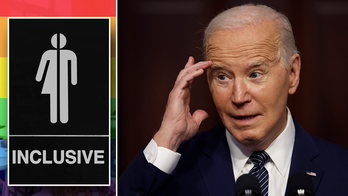by Eve Zibel & Reena Ninan
Prime Minister Benjamin Netanyahu won't be getting a "cheeseburger summit" when he comes to Washington Tuesday, but he will be getting a very public meeting in the Oval Office with President Obama, something that has not happened in the last two times the Israeli prime minister has come to Washington.
The White House is putting on a full-court press for the Netanyahu trip, calling the relationship between Israel and the United States a "special" one, a term usually reserved for a country like Great Britain or Canada, and saying all reports of trouble between the two countries is not an issue.
"There's no rift between us and Israel," Daniel Shapiro, Senior Director for the Middle East and North Africa at the White House said on a conference call with reporters. "This is a relationship that is very strong and important to us."
The welcome wagon may be arriving at the steps of the Blair House where Netanyahu is staying, putting the prime minister across the street from the White House instead of a hotel like previous visits, but that doesn't mean all is well between the two sides. Experts say the White House is going to put on a good show in order to help Democrats who typically seek to secure Jewish votes and who are up for election in November. "This meeting could go better because of the U.S. mid-term elections," says David Makovsky the co-author of the book "Myths, Illusions and Peace" and a Senior Fellow at the Washington Institute for Near East Policy.
"In the past there was a huge amount of buzz because there was no photo of Netanyahu and Obama. There will be more cameras at this handshake," Makovsky predicted.
The previous meetings, May 2009 and March 2010, were both behind closed doors. The White House offered no explanation for the lack of press coverage, but many thought the on-going disagreement between the two sides over various issues was why the White House refused to allow cameras into the meeting.
This time, experts say if the White House did not open the meeting between the two leaders it would only show the problems that exist between the two sides.
"What it would show is just how dysfunctional the U.S.-Israeli relationship has become when two masters of the media can't have a meeting with open press," Aaron Miller of the Woodrow Wilson Center told Fox.
While the two men may smile for the camera, there are some very real issues that have to be discussed, including Iran, proximity talks (the indirect talks between the Israelis and Palestinians) and a settlement moratorium set to expire in September. Experts say what isn't said at the meeting will be more telling.
Fox News Jerusalem correspondent Reena Ninan reports the Israeli prime minister will ask for more sanctions against Iran at the meeting on Tuesday and Israeli administration officials tell Ninan the prime minister would like to see the European Union and other countries pass their own sanctions.
Miller says on the issue of Iran, the two sides may tacitly agree to plans but won't speak of the specifics, which could include secret plans by Israel to develop weapons that would protect the country from a potential military strike.
"Much will not be said in this meeting. The reality is that on the question of a nuclear Iran, no Israeli prime minister can ever abandon an independent capacity to act in defense of Israel's national interests. And all of the reassurance in the world (and Obama will certainly seek to reassure) won't guarantee that Israel will not act if it feels it must," Miller says.
While there may not be a final agreement on Iran at the White House meeting, Obama and Netanyahu will try to move forward on proximity talks and the White House says it is "encouraged" by the progress.
"The president believes that we have made a good deal of progress through the proximity talks in narrowing those gaps that it's important for all parties to seize an opportunity here to move forward," Deputy National Security Adviser Ben Rhodes said on the White House conference call. "He underscored the importance of moving to direct talks in his meeting with Abu Mazen [Mahmoud Abbas]. And we'll have the opportunity to continue to move in that direction with this visit from Prime Minister Netanyahu, as well."
But experts say the optimistic tone may not last. "It's a tough issue. Netanyahu has not shared his bottom line with Obama. It could be a point of contention," Makovsky told Fox News.
Miller goes even further saying the talks themselves show "how screwed up" the negotiations between the two sides really are and that even if the two sides began to talk directly, the "gaps between them are simply too large to bridge."
"Proximity talks and direct negotiations will not fix the problem. In the end, wisely or unwisely, this whole will lead to a U.S. set of bridging proposals or a plan. The challenge for the Obama administration-- if they go this route-- is to avoid failure. Another Camp David July 2000 summit and you might just as well hang a closed for the season sign on prospects for a two state solution," says Miller.
Senior Israeli officials tell Fox their main objective of the meeting will be to focus on the restarting of direct talks between the Israelis and Palestinians. Reena Ninan reports that officials say Netanyahu wants the talks to begin as soon as possible, however the key issue remains the 10 month construction freeze (also called a moratorium) on new settlements with senior advisers saying “the government’s position hasn’t changed.”
The moratorium on building new settlements, announced last year, permits the building of projects started before November 25 and excludes both Jerusalem and the disputed Golan Heights area on the border with Syria. The moratorium expires September 26.
Makovsky says the president needs to create some common ground with Netanyahu on how to handle everything after September 26. “Obama needs to feel that he’s diffused this ‘post September 26 issue’, extend the moratorium and get direct talks.”
Ninan also reports that Abbas says he won’t enter direct talks until the borders of a Palestinian state are established, and in exchange the Palestinian president will work out an agreement on security regarding Israel’s security needs.
For its part, the White House isn't commenting on Obama hosting some sort of tri-lateral U.S./Palestinian/Israeli summit to start direct negotiations. "We have not yet reached the point where we are discussing the kind of scenario...for instance a meeting here in Washington," Rhodes said. "Our focus is to narrow the gaps -- to use these proximity talks, which are focused on the full range of substantive issues between Israelis and Palestinians, but to use those talk to narrow gaps and to create the best conditions possible to move toward direct negotiations."
Regardless of the future of Israel/U.S. relations and perhaps a tri-lateral summit, experts like Makovsky say it’s time for the two sides to work together. “Neither of them may love each other but each of them need a modicum of a working relationship. Beyond the specifics, they have to find a way to work with each other. They can’t have impression they actively dislike each other.”




